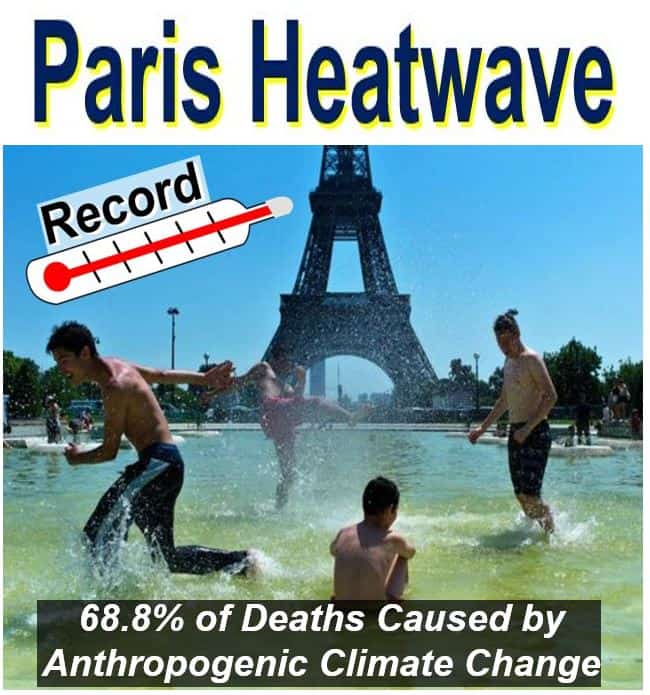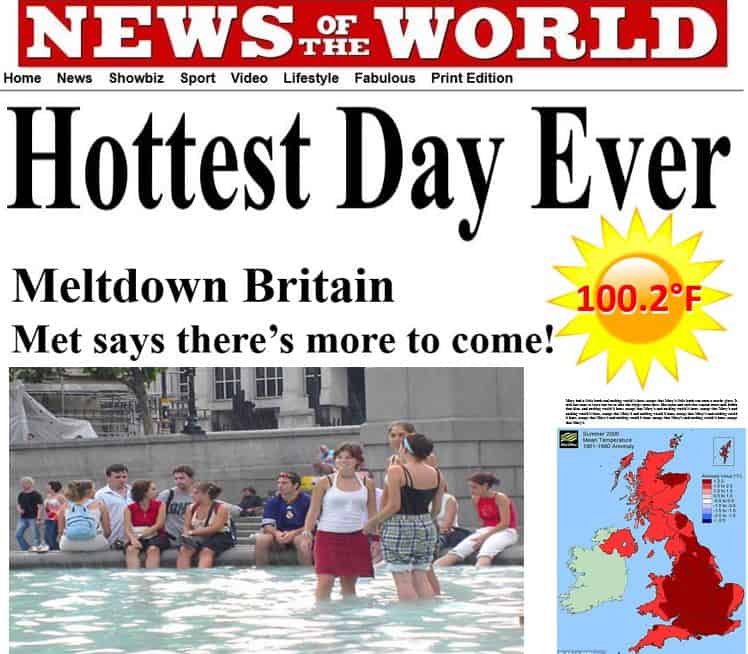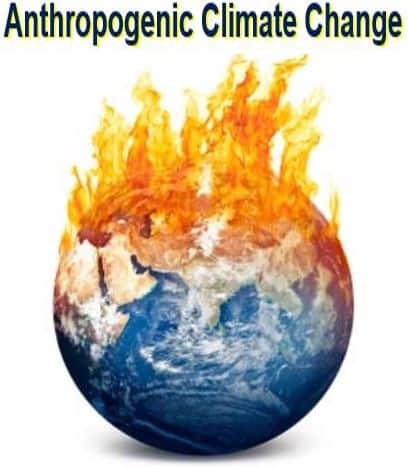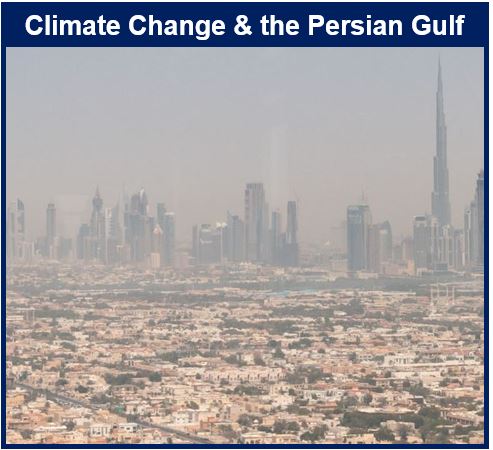Heatwave deaths in Paris and London during the severe 2003 heatwave were exacerbated by human activity – climate change caused by us increased the death toll during those scorching summer months considerably, according to a new study carried out by a team of British and American scientists.
The researchers explain in the journal Environmental Research Letters that in the 2003 heatwave that affected many European cities, out of 735 fatalities in Paris, 506 were directly attributed to climate change caused by humans, also called anthropogenic climate change.
This is the first study to give a precise number on how many deaths during a given period were caused by human activity which affected the climate – in this case, it made the heatwave more severe and perhaps longer-lasting too.
 In the heatwave of 2003 in Paris, 68.8% of all heat-related deaths were directly linked to human-induced climate change.
In the heatwave of 2003 in Paris, 68.8% of all heat-related deaths were directly linked to human-induced climate change.
While the additional number of deaths directly linked to anthropogenic climate change during the heatwave in London was not as great as in Paris – 64 out of a total of 315 heat-related deaths – the figure was still statistically significant, the authors wrote.
The researchers, from the Union of Concerned Scientists in the United States; Public Health England, the University of Oxford, Reading University, and the Centre for Ecology and Hydrology, all in England, believe their study and findings provide policymakers with useful information regarding the damaging effects of heatwaves today, so that they can better plan for the future challenges of climate change.
Lead author, Dr. Daniel Mitchell, from the University of Oxford’s Environmental Change Institute, and colleagues put the results of several model simulations of the 2003 heatwave into a health impact assessment of mortality rates.
Thousands of volunteers helped
Several thousand volunteers from the weather@home project donated computer time to the study. It is thanks to them, the authors wrote, that they managed to run many thousands of high-resolution regional climate model simulations.
 Scientists say that the heatwaves like the one that hit London and other European cities in 2003 will occur more frequently in future.
Scientists say that the heatwaves like the one that hit London and other European cities in 2003 will occur more frequently in future.
Their findings showed that anthropogenic climate change had a significant effect on heat-related deaths during the 2003 heatwave – a 20% increase in London and 70% in central Paris.
This study just focused on the death rates in the French and British capitals. Many other European cities also registered record or near record heatwaves that summer, and were most likely affected in similar ways. It is very possible that some cities experienced even higher death rates than Paris.
The study focused on the June-to-August period of 2003, which the scientists say broke several records in many parts of the continent.
First study to link human activity to number of deaths
Several prior studies had looked at the human activity link to heatwave severity and frequency, as well as those of other extreme weather events. However, none of them provided specific numbers regarding human mortality totals or rates – this was the first study to do this.
Dr. Mitchell said:
“It is often difficult to understand the implications of a planet that is one degree warmer than pre-industrial levels in the global average, but we are now at the stage where we can identify the cost to our health of man-made global warming.”
“This research reveals that in two cities alone hundreds of deaths can be attributed to much higher temperatures resulting from human-induced climate change.”
This study clearly shows that we now have a responsibility to limit any further damage caused by anthropogenic climate change.
Dr. Peter Frumhoff, who works for the Union of Concerned Scientists, said:
“By starkly showing we can measure the toll in human lives that climate change is already taking through worsening extreme heat, this study shines a spotlight on our responsibilities as a society for limiting further damage.”
 According to global-greenhouse-warming.com: “Anthropogenic climate change refers to the production of greenhouse gases emitted by human activity. By examining the polar ice cores, scientists are convinced that human activity has increased the proportion of greenhouse gases in the atmosphere, which has skyrocketed over the past few hundred years.”
According to global-greenhouse-warming.com: “Anthropogenic climate change refers to the production of greenhouse gases emitted by human activity. By examining the polar ice cores, scientists are convinced that human activity has increased the proportion of greenhouse gases in the atmosphere, which has skyrocketed over the past few hundred years.”
Heatwaves will become more deadly
The researchers point out that their findings highlight an emerging and growing trend. Future heatwaves and other extreme weather events are forecast to occur more frequently, for longer periods and more severely – however, of all the extreme weather events, heatwaves will be the most severely affected.
Scientists now need to carry further studies on possible changes in future death rates, taking into account population and demographic changes.
In an Abstract that preceded the main paper in the journal, the scientists wrote:
“In summer 2003, anthropogenic climate change increased the risk of heat-related mortality in Central Paris by ~70% and by ~20% in London, which experienced lower extreme heat.”
“Out of the estimated ~315 and ~735 summer deaths attributed to the heatwave event in Greater London and Central Paris, respectively, 64 (±3) deaths were attributable to anthropogenic climate change in London, and 506 (±51) in Paris. Such an ability to robustly attribute specific damages to anthropogenic drivers of increased extreme heat can inform societal responses to, and responsibilities for, climate change.”
 Scientists warn that by the end of this century, the Persian Gulf may become too hot for humans to live in. (Image: Loyola Marymount University)
Scientists warn that by the end of this century, the Persian Gulf may become too hot for humans to live in. (Image: Loyola Marymount University)
What is climate change?
Climate change, also known as global warming, is a term used to describe the change in the statistical properties of the climate system of our planet over a prolonged period.
That means that changes that occur over shorter periods – less than a few decades – such as El Niño or La Niña, are not considered to be climate change.
Climate change can be caused by volcanic eruptions, fluctuations in solar radiation, a large celestial body such as an asteroid crashing onto the Earth’s surface, biotic processes, and human activities.
We are currently experiencing climate change, which this time is mainly caused by human activities – the changes pose significant risks for human and natural systems.
If measures are not taken to stop the process of the current climate change, sea levels could rise considerably by the end of this century, flooding hundreds of millions of people out of their homes and towns, some parts of the world will become to hot to live in, animal and plant migration patterns will change considerably, plus there will be more frequent and severe hurricanes, heatwaves and other extreme weather events.
Citation: “Attributing human mortality during extreme heat waves to anthropogenic climate change,” Peter Frumhoff, David Wallom and Myles Allen, Chris Huntingford, Giacomo Masato, Daniel Mitchell, Clare Heaviside, Andy Bowery, Sotiris Vardoulakis and Benoit P Guillod. Environmental Research Letters. 8 July, 2016. DOI: 10.1088/1748-9326/11/7/074006.
Discover more from Market Business News
Subscribe to get the latest posts sent to your email.

